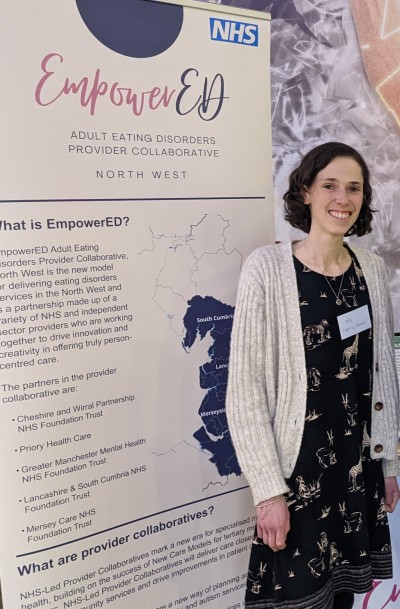Anyone can develop an eating disorder. Anyone can have an eating disorder. By EmpowerED Expert by Experience Molly:

Molly discusses some of the processes that can, for some people, make controlling your eating feel rewarding in an open and honest manner so please be aware that this could be triggering to read if you are experiencing difficulties with your own eating. You may wish to consider reading some of our other Expert by Experience accounts that emphasise other aspects of an eating disorder including the impact of the illness on people’s health and wellbeing.
Anyone can develop an eating disorder. Anyone can have an eating disorder
By EmpowerED Expert by Experience Molly,
Describe an eating disorder. What does it look like? A skeletal frame; frailty; eating nothing at all; selfishness; an obsession with body image…? We all have preconceived ideas about eating disorders.
My family used to joke that “Molly could never develop an eating disorder”. “She loves food too much” they’d say. And they are right – I love food. Ignoring it, restricting, was and still is, hard work. It’s a real test of willpower. But that means there’s a strength that comes from beating the temptation. When I succeed in restricting, my body feels strong. I become acutely aware of it. My legs ache and let me know they’re there, my body shivers with cold and my stomach grumbles. My heartbeat even feels stronger – I’m certainly more conscious of it. There’s something very grounding in the sensations of a starving body. An aliveness that comes from being on the edge of death. I feel mentally alert too. I detach from hunger pangs and concentrate with an intensity that feels energising. I’m taking that idiom, ‘mind over matter’, a little too literally. Testing it out, my mind defeats my matter.
“My life is going too well to develop an eating disorder”. And outwardly, it was. I could hide behind my achievements. After all, a problem is surely only really a problem once my work is suffering. Success equals happiness and while I’m successful... well, I must be happy enough. I got onto my dream course at my ideal university. However, there was a growing disorder behind this success. I never quite felt I fitted in. An eating disorder begins to emerge, giving me someone to be, an identity and a degree of control. My safety blanket.
“Molly is too sporty”. Too physically fit and strong to develop an eating disorder. My body has a purpose and I enjoy feeling powerful. And I know too that to be strong a body must be fuelled. Without food I cannot be powerful and my performance suffers. The thing is, we can know and believe two very different things. I know I need to eat well; I don’t believe my body will fail. How far can I push it? Exercise becomes another form of abuse for my body.
Then, once you begin disordered behaviour, it becomes an addiction. Politely declining a biscuit as the tray is passed around, becomes who you are and your next high comes in affirming that identity. If you think of yourself as someone who’s a good cook, then a successful dinner party leaves you feeling good. In the same way, I feel a high when I successfully decline food. This is my central identity and I affirm it again and again. Each time it becomes more the core of me until nothing is more important than scoring my next hit; food and resisting it.
I feel safe, strongest, like the best version of me, now my physical form is shrunk, now my mind is singular and focused on one thing. Now there’s rules to contain me in too open a world. I am in control.
It’s hard for people, me included, to see an eating disorder when the person doesn’t fit your preconceptions of ‘a person with an eating disorder’. When they are in its grip but not skeletal, when they are outwardly successful but developed strategies to hide disordered behaviours. I don’t necessarily act like the assumed stereotype – I’ve never shown any interest in fashion, I don’t use social media and am not obsessed with body image; we’re a close family who always ate around the table, together; and I never entirely stop eating.
So, what does an eating disorder look like? … It’s not a dichotomy of course – eating disorder and non-eating disorder. It doesn’t look like any one thing and it refuses to be contained in stereotype. An eating disorder is the perfect strategy for someone like me, like a person you know, who “could never develop an eating disorder”.
“People generally see what they look for, and hear what they listen for” [Harper Lee] Challenge those preconceptions.
